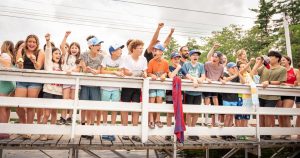As the seventh wave of COVID, this one driven by the Omicron BA.5 subvariant, rampages through Canada, Jewish summer camps across the country have had to adjust their plans. For many camps, that meant moving their visitors day to the phone or online.
Some camps, such as Camp Manitou near Parry Sound, Ont., elected to hold their visitors day in-person as usual. Others, including Camp Massad in Quebec and Camp Kadimah in Nova Scotia, decided months ago to move their visitors days online. Camp New Moon, in Ontario’s Muskoka region, held off until the middle of July to make that same call.
“Many camps elected to cancel long before the summer started. They were precautionary. We wanted to continue to follow the evidence and the trends, so we kept our options open,” said Jack Goodman, who is the co-owner and director of Camp New Moon as well as a member of the Ontario Camping Association’s COVID Action Committee.
New Moon eventually decided to forgo an in-person visitors day not just because of fears surrounding COVID, but other diseases as well.
“As we communicated to our parents, canceling visitors day was not just about the rising concern of COVID coming into camp, it was the rising concern of so many communicable illnesses that the community is overrun with now,” said Goodman.
“We’d much rather have disappointed campers; it’s easy for them to get over that a lot faster than getting over an illness.”
“There’s been a sudden rise in hand foot, mouth disease, GI tract disturbances, all sorts of things, lot of the influenza-like diseases that everyone gets better from, but a lot of these things aren’t typically seen in the summer. And last summer, we saw a huge reduction in the number of COVID cases because public health restrictions were still in place, masks were still required, and so on and so forth.
“Now we see a surge in COVID, which is completely opposite to what happened last summer.”
Camp Timberlane, which is near Haliburton, Ont., decided in mid-June to let every camper call their parents instead of hosting an in-person visitors day.
“It’s 1,500 people hugging and kissing and really on top of each other. It’s not just with people passing by, and it’s very, very close contact. So we really decided to go against it,” said Brit Lowes, one of the directors.
Between 9 a.m. and 4:30 p.m. each of the 400-odd campers was allocated 10 minutes to make a phone call to their would-be visitors. Although it was a change from the usual proceedings, most families took it in stride.
“When we told (parents) that we weren’t having visitors day, there were two people who were annoyed, and the rest went ‘thank God,’” Lowes said. “They were basically fine with it. A lot of people were disappointed. They want to see camp. We’ve had the kids in camp for two years now, (their parents) have never seen it. It’s a disappointment from that point of view, but it’s okay.”
The uptick in COVID cases has the potential to affect more than just visitors day for camps. According to Goodman, since public health measures were relaxed across the board this year, there were no guidelines that camps had to follow at the beginning of the summer; instead, it was up to individual camps to determine the optimal way for them to strike a balance between keeping everybody healthy and providing the best summer for their campers.
However, as COVID cases have risen, public health units have reached out to camps with more information. For example, multiple units in Ontario that contain a number of recreational camps have recently provided new guidelines or re-emphasized the importance of older ones.
On July 14, the Simcoe Muskoka District Health Unit sent out a letter to all camps in its jurisdiction advising them of new COVID guidelines, and the Haliburton Kawartha Pine Ridge District Health Unit sent a similar letter on July 20 that referenced a document of best practices from December of 2021, as well as updated new rules for camps undergoing COVID outbreaks.
Both of those units also keep track of the COVID outbreaks in their domains. So far this year, Simcoe Muskoka has recorded six camps that have had COVID outbreaks (they do not provide the names of the camps), two of which have officially been declared over. Haliburton Kawartha Pine Ridge has recorded four camps that have had outbreaks, three of which have officially been declared over.







